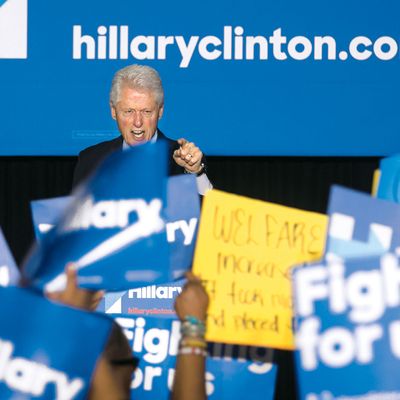
Depending on your perspective, the fact that Bill Clinton will be addressing the Democratic convention on the same evening as the seven “Mothers of the Movement” — African-American moms who lost children to violence, mostly by police, and became inspirations for Black Lives Matter — might strike you as a little odd or uncomfortable. After all, Clinton has a complex legacy on racial issues. It was just a year ago in Philadelphia when he got into a verbal altercation with BLM activists. With the mothers speaking tonight, it will be the wrong evening for anyone else to strike a discordant note when it comes to race relations.
Not that he lacks credibility with black voters, of course. Bill Clinton was famously called the “first black president” by Toni Morrison. He has always commanded robust African-American support in his own election campaigns.
But, in his successful 1992 presidential bid, he made a display of returning to Arkansas to order the execution of Ricky Ray Rector, a lobotmized African-American man, allegedly to show his toughness. He also made a similar, if less lethal, symbolic use of black rapper Sister Souljah, whom the candidate dressed down at a Rainbow Coalition event for appearing to encourage black-on-white violence.
As president, Clinton conspicuously ordered a review of affirmative-action policies — but then announced he had decided to “mend, not end” them. He signed a welfare-reform law that disproportionately targeted unwed black mothers for work requirements and other sanctions. But he also fought to “make work pay” with major increases in the earned-income tax credit and other resources for the working poor. He was an important political resource in the reelection of Barack Obama in 2012. Yet, in 2008, the 42nd president came perilously close to igniting racial conflict in South Carolina by suggesting Obama was not qualified for the office and was just another minority protest candidate like Jesse Jackson.
In 2016, his policy record on criminal-justice issues has been under heavy scrutiny from the left, especially the crime bill he signed in 1994 — the subject of his shouting match with BLM protesters a year ago.
But my guess is Bill Clinton will do just fine. His relationship with African-Americans is that of the first generation of southern white men who both experienced the Jim Crow system and deplored it and fought its legacy. His occasional sins against black sensibilities are those of a close, even intimate acquaintance, hailing from poverty, eating the same food, listening to a lot of the same music, and spending Sundays in similar, if not the same, Baptist and Methodist and Pentecostal churches. He will be forgiven things someone from California or New York or Wisconsin could not get away with. And like Obama, he also benefits from the hatred of conservatives for policies that just make good sense to black folks.
Bill Clinton has not been especially prominent in this election cycle, but now that his wife is on the brink of joining him in the ranks of Democratic presidential nominees, it would not be surprising to see him rise to the occasion. And listeners black and white will probably be moved by his tributes to her, and his reminders of how far they’ve all come together.






























